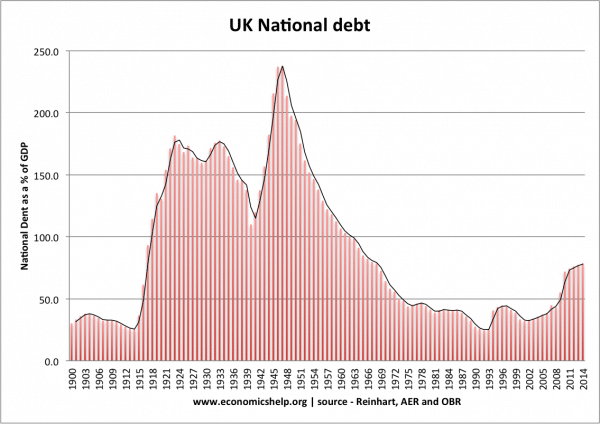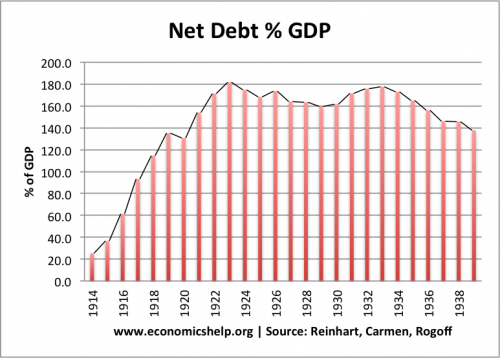Readers Question on Debt and GDP

Readers Question: OK so the debt to GDP looks manageable when it is compared to the figure during the world wars but :
Q1. how do you calculate GDP rationally in wartime , did factories sell tanks to the army, were soldiers and workers paid commensurately for their labour ?
GDP will be measured the same in wartime as in peace time. GDP can be measured in three ways – National income, national output and national expenditure (they all should equal the same figure. See: Circular flow of income)
Soldiers were paid a wage by the government and this would have counted towards national income. Similarly the government bought tanks / equipment off private firms. This expenditure on arms would have counted as national expenditure. The arms tanks produced by private firms and government owned enterprises would all have counted towards National GDP.
I don’t have statistics, but I’m fairly certain real GDP increased during the Second World War. Unemployment fell and there was a rise in real GDP. Though, the Second World War was also a time of rationing and limited household spending power. Showing that a rise in GDP, doesn’t necessarily lead to higher living standards. We were spending money on arms, not food.
2 . We were at war, why would similarly excessive debts in peacetime be reasonable?
It depends what you mean by reasonable. I would see reasonable debt as
- Debt that we can afford to pay back.
- Debt that is being used to finance something useful for the economy – e.g. infrastructure investment to increase future capacity, expansionary fiscal policy to avoid recession. If the government borrow for the right reasons, then this borrowing can be beneficial for the long-term of the economy, leading to stronger tax revenues in the future. If you cut debt levels, without regard for consequences, it can be damaging – even self defeating.
- Can the government afford to borrow?
A useful post is – How much can a government borrow?
3. Think of the position of the UK in 1914 , BP had just secured practically all the oil in the Middle East, the Empire was immense, we had the biggest fleet in the world, we were a good investment, now the future is less rosy, is it not ?
It depends which way you look at it. You could say Britain had immense wealth in 1914 (compared to the rest of the world). But, firstly, relying on the Empire to increase wealth was wrong from a moral point of view. Quite rightly countries in the Empire were agitating for their independence and the right to benefit from their own countries wealth. Why should the UK benefit from oil in the middle East and resources in India? Empire building is not a good way to improve economic welfare because it involves one country benefiting at the expense of others.
The other thing about Empire is that it can damage the long-term productivity of the economy. If you can rely on wealth from importing raw materials from other countries, then it can reduce incentives to innovate and rely on rising labour productivity. If you look at Germany and Japan post Second World War – they started with very little natural resources, but built a successful economy on successful innovation, technology and improving labour productivity. By comparison, post-war, the UK fell behind – possibly due to complacency from having an ‘easy ride’ during the Empire years. A similar situation is the ‘Dutch Disease‘ – when a country suffers from the result of discovering a lot of raw materials, such as oil. Is it a blessing or curse for a country to discover a lot of oil and gas reserves?
Also, the First World War practically bankrupted the country, and the 1920s and 1930s became a lost decade – with high unemployment and low growth.
One of the biggest mistakes of the 1920s, was pursuing deflationary fiscal and deflationary monetary policy – combined with rejoining the Gold Standard (which kept the value of the Pound overvalued, leading to less exports)
The interesting thing about the First World War, is that after the war, there was a prolonged economic stagnation which failed to reduce government debts – despite attempts at running a primary budget surplus.
4. Generally resources have been de-graded , soils depleted and markets are harder to satisfy , should this not require an ever reduced debt load.
If you have declining natural resources and environmental depletion, then this can affect long-run rates of economic growth. If the damage to the environment is so severe long-term economic growth is affected, then it will reduce ability to gain future tax revenues, and concepts of what we can pay back, may change. Often we borrow on the assumption, we will continue to grow. If economic growth stopped, then current debts would be less manageable.
Related


Can anyone tell me if the average persons purchasing power has increased from 1913 to 2016?